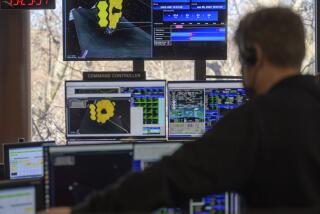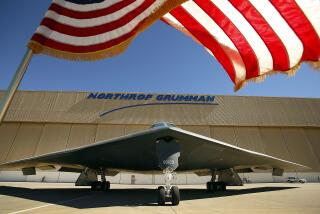Northrop Sets $124-Million Writeoff on Defense Project : Charge Will Result in Quarterly Loss; Analysts Believe Action Is Linked to Stealth Bomber Technical Problems
- Share via
Northrop Corp. said Monday that it will take a $124-million pretax charge against profits on a defense program believed to be the Stealth bomber, an action that will result in a quarterly loss.
It is the second significant writeoff on the bomber contract in only nine months and signifies that Northrop has continued to encounter some technical difficulties in developing the revolutionary, top-secret aircraft. The severity of the problems is secret but Air Force officials have expressed confidence in the program.
The Los Angeles-based aerospace firm said the writeoff was prompted by an increase in the estimated cost to complete work on “on a long-term research and development program,” the kind of indirect language the company usually adopts when it must refer to the bomber, formally known as the Advanced Technology Bomber (ATB).
The bomber, by some estimates, now contributes more than half of all of Northrop’s revenue, a risky position for any defense contractor. Northrop has more than 12,000 employees at its Pico Rivera fabrication plant and up to 1,500 employees at its large Palmdale assembly plant, two facilities devoted to Stealth work.
Northrop shares dropped $1.625 Monday to close at $42.625 on the New York Stock Exchange, but trading was light and many investors were waiting to see how the stock fared in today’s market.
‘Should Have Been Flying’
Aerospace analyst Paul Nisbet of Prudential Bache Securities said he believes that Stealth bomber development costs have increased from an originally planned $10 billion to as much as $13 billion or $14 billion.
“The plane should have been flying by now and it isn’t,” Nisbet said. “That is a slip from earlier projections that had it flying earlier this year.”
The writeoff announced Monday triggered a sharp reduction in analysts’ estimates of Northrop’s 1987 profits. John Simon of Seidler Amdec Securities cut his estimate from $3.50 per share to between $1 and $2 per share, a spread that reflects continued uncertainty about what profits will be in later quarters, he said.
Under the writeoff, Northrop will reduce its computed profit margin on the bomber contract from the beginning of the contract, the date of which is classified, through May 31. To fully understand the basis for that action requires speculation, analysts said.
The Air Force has never indicated what type of contract Northrop has for the bomber program, but analysts believe that it is a “cost-plus” type agreement that provides for both fixed fees and incentive fees tied to Northrop’s performance on cost, schedule and technical accomplishment.
Shifted Timing of Funds
If the cost of development has exceeded certain targets and the schedule has been stretched out because of technical difficulties, then Northrop’s profit margin would fall for two reasons: First, it may lose some of its incentive fees. Second, its fixed fees would have to be stretched out over a longer period of time.
Another factor, perhaps a more important one, is increasing Northrop’s profit problems on the Stealth bomber program. The Air Force said last month that it has shifted the timing of certain funds for the program.
Gen. Larry Welch, Air Force chief of staff, said an unspecified amount of money has been moved from production to “front-end” development, which might include such things as special production tooling. Production tooling often carries no profit or little profit, which may tend to drive down overall margins.
All of the guesswork sometimes confuses analysts, but they are not the only ones who are guessing.
“I am not going to . . . tell you that we understand all costs and risks associated with the ATB program,” Welch said. “Because clearly, that’s a naive thing to say at this point in the program.”
Welch said last month that there has been no increase in the overall cost of 132 of the bombers, which is estimated at $36.6 billion in 1981 dollars. Nonetheless, Rep. Les Aspin (D-Wis.), chairman of the House Armed Services Committee, has expressed concern about the cost of the bomber under the Northrop contract and has called on the Air Force to establish a competition to build it.
Northrop said the $124-million writeoff will reduce net income by $75 million or $1.59 per share. The company said it will not have to make any future financial adjustments on the program and expects to earn future profits on the work.
More to Read
Inside the business of entertainment
The Wide Shot brings you news, analysis and insights on everything from streaming wars to production — and what it all means for the future.
You may occasionally receive promotional content from the Los Angeles Times.











